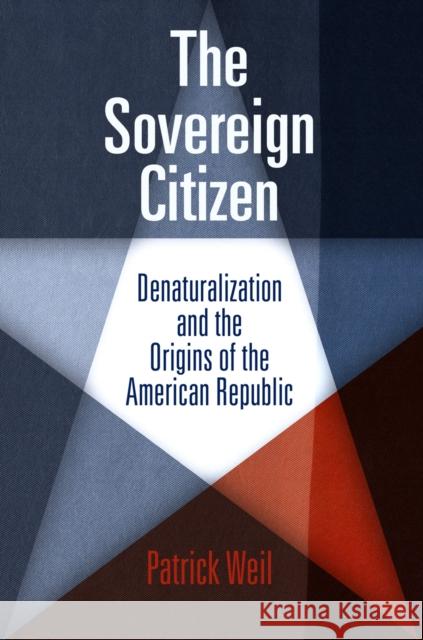The Sovereign Citizen: Denaturalization and the Origins of the American Republic » książka
The Sovereign Citizen: Denaturalization and the Origins of the American Republic
ISBN-13: 9780812222128 / Angielski / Miękka / 2012 / 296 str.
The Sovereign Citizen Denaturalization and the Origins of the American Republic Patrick Weil "In vividly depicting the long struggle to secure the citizenship rights of Americans, Weil treats us to striking insights as well as delicious tidbits of newly discovered data."--Norman Dorsen, former President of the American Civil Liberties Union "One of the world's leading experts on nationality brilliantly explores past campaigns to strip Americans of their citizenship. Patrick Weil reveals how both bureaucratic rigor and national security zeal threatened citizenship rights, and points to important lessons for twenty-first century debates."--Gerald Neuman, Harvard Law School "In this masterful and timely book, Patrick Weil plunges deep into rarely used archives to write a new history of the shaping of American identity in the twentieth century, all the more important as we now debate the reform of immigration law. This story of belonging and exile has its heroes --defenders of civil liberties who deserve to be better known--and its scoundrels. Unlike many histories, it has a heartening conclusion." --Linda K. Kerber, author of No Constitutional Right to Be Ladies: Women and the Obligations of Citizenship Present-day Americans feel secure in their citizenship: they are free to speak up for any cause, oppose their government, marry a person of any background, and live where they choose--at home or abroad. Denaturalization and denationalization are more often associated with twentieth-century authoritarian regimes. But there was a time when American-born and naturalized foreign-born individuals in the United States could be deprived of their citizenship and its associated rights. Patrick Weil examines the twentieth-century legal procedures, causes, and enforcement of denaturalization to illuminate an important but neglected dimension of Americans' understanding of sovereignty and federal authority: a citizen is defined, in part, by the parameters that could be used to revoke that same citizenship. Patrick Weil is Senior Research Fellow at the French National Center for Scientific Research (CNRS) and Professor at the Paris School of Economics. He is author of numerous books, including How to Be French: Nationality in the Making Since 1789. Democracy, Citizenship, and Constitutionalism Dec 2012 224 pages 6 x 9 ISBN 978-0-8122-2212-8 Paper $34.95s 23.00 ISBN 978-0-8122-0621-0 Ebook $34.95s 23.00 World Rights Law, Political Science, Public Policy Short copy: Present-day Americans may feel secure in their citizenship, but there was a time when citizens could be denationalized. Patrick Weil examines the twentieth-century legal procedures, causes, and enforcement of denaturalization to illuminate an important and neglected dimension of American citizenship, sovereignty, and federal authority.
The Sovereign CitizenDenaturalization and the Origins of the American RepublicPatrick Weil"In vividly depicting the long struggle to secure the citizenship rights of Americans, Weil treats us to striking insights as well as delicious tidbits of newly discovered data."--Norman Dorsen, former President of the American Civil Liberties Union"One of the world's leading experts on nationality brilliantly explores past campaigns to strip Americans of their citizenship. Patrick Weil reveals how both bureaucratic rigor and national security zeal threatened citizenship rights, and points to important lessons for twenty-first century debates."--Gerald Neuman, Harvard Law School"In this masterful and timely book, Patrick Weil plunges deep into rarely used archives to write a new history of the shaping of American identity in the twentieth century, all the more important as we now debate the reform of immigration law. This story of belonging and exile has its heroes --defenders of civil liberties who deserve to be better known--and its scoundrels. Unlike many histories, it has a heartening conclusion." --Linda K. Kerber, author of No Constitutional Right to Be Ladies: Women and the Obligations of CitizenshipPresent-day Americans feel secure in their citizenship: they are free to speak up for any cause, oppose their government, marry a person of any background, and live where they choose--at home or abroad. Denaturalization and denationalization are more often associated with twentieth-century authoritarian regimes. But there was a time when American-born and naturalized foreign-born individuals in the United States could be deprived of their citizenship and its associated rights. Patrick Weil examines the twentieth-century legal procedures, causes, and enforcement of denaturalization to illuminate an important but neglected dimension of Americans' understanding of sovereignty and federal authority: a citizen is defined, in part, by the parameters that could be used to revoke that same citizenship.Patrick Weil is Senior Research Fellow at the French National Center for Scientific Research (CNRS) and Professor at the Paris School of Economics. He is author of numerous books, including How to Be French: Nationality in the Making Since 1789.Democracy, Citizenship, and ConstitutionalismDec 2012 | 224 pages | 6 x 9ISBN 978-0-8122-2212-8 | Paper | $34.95s | L23.00 ISBN 978-0-8122-0621-0 | Ebook | $34.95s | L23.00 World Rights | Law, Political Science, Public PolicyShort copy:Present-day Americans may feel secure in their citizenship, but there was a time when citizens could be denationalized. Patrick Weil examines the twentieth-century legal procedures, causes, and enforcement of denaturalization to illuminate an important and neglected dimension of American citizenship, sovereignty, and federal authority.











